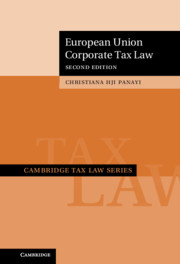Book contents
- Frontmatter
- Dedication
- Contents
- Foreword to the First Edition by Malcolm Gammie QC
- Foreword to the First Edition by Michael Lang
- Foreword to the Second Edition by Philip Baker
- Preface to the First Edition
- Preface to the Second Edition
- 1 A Historical Trajectory of EU Corporate Tax Law
- 2 EU Corporate Tax Legislation
- 3 The Court of Justice and the Development of EU Corporate Tax Law
- 4 Tax Obstacles to the Cross-Border Movement of Companies: Direct Investment
- 5 Tax Obstacles to Cross-Border Portfolio Investment
- 6 Reorganisations under EU Tax Law
- 7 Tax Avoidance and EU Law
- 8 State Aid and Taxation
- 9 EU Corporate Tax Law: More Interim Conclusions and Thoughts
7 - Tax Avoidance and EU Law
Published online by Cambridge University Press: 28 May 2021
- Frontmatter
- Dedication
- Contents
- Foreword to the First Edition by Malcolm Gammie QC
- Foreword to the First Edition by Michael Lang
- Foreword to the Second Edition by Philip Baker
- Preface to the First Edition
- Preface to the Second Edition
- 1 A Historical Trajectory of EU Corporate Tax Law
- 2 EU Corporate Tax Legislation
- 3 The Court of Justice and the Development of EU Corporate Tax Law
- 4 Tax Obstacles to the Cross-Border Movement of Companies: Direct Investment
- 5 Tax Obstacles to Cross-Border Portfolio Investment
- 6 Reorganisations under EU Tax Law
- 7 Tax Avoidance and EU Law
- 8 State Aid and Taxation
- 9 EU Corporate Tax Law: More Interim Conclusions and Thoughts
Summary
Chapter 7 examined the concept of tax avoidance in the context of EU law. This chapter also examined various types of anti-abuse rules and their compatibility with EU law. An attempt was made to assess the Court’s judgments in the area of controlled foreign companies, thin capitalization and transfer pricing. The position following the introduction of the Anti-Tax Avoidance Directive was also assessed, whenever relevant. It was shown that there is some tension between established case law and the provisions of the Anti-Tax Avoidance Directive, most of which apply primarily in a mechanical way. What was also notable was the shift of emphasis from having the Court of Justice scrutinize national anti-abuse rules, to demanding from Member States to introduce de minimis anti-abuse rules based on this Directive. As regards transfer pricing rules, it was argued that the current judgments of the Court of Justice could give rise to variable interpretation of basic concepts of international tax law, due to the obscure relationship between the Court’s commercial justification test and the OECD’s arm’s length principle.
Keywords
- Type
- Chapter
- Information
- European Union Corporate Tax Law , pp. 291 - 330Publisher: Cambridge University PressPrint publication year: 2021



